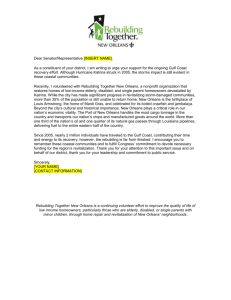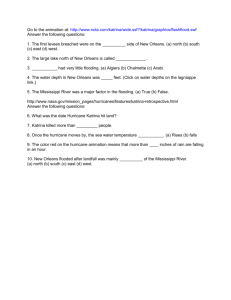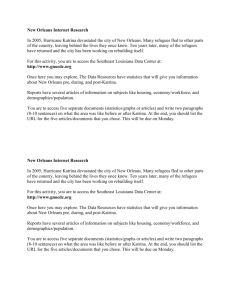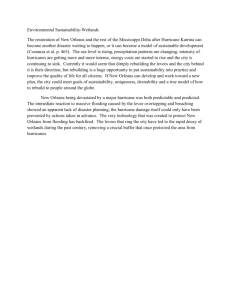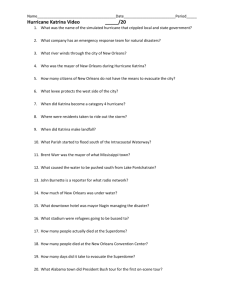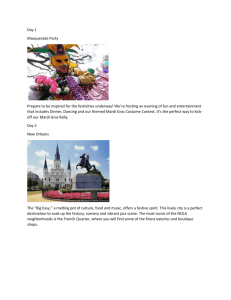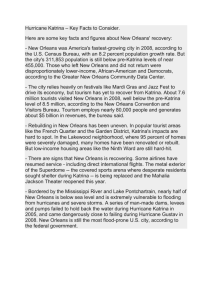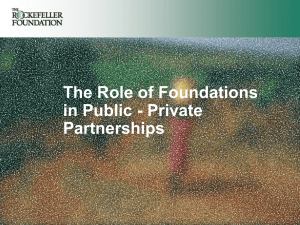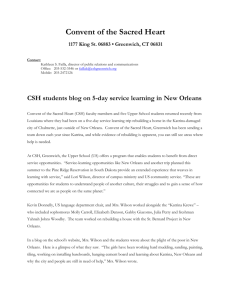Service Learning - University of Wisconsin–Milwaukee
advertisement
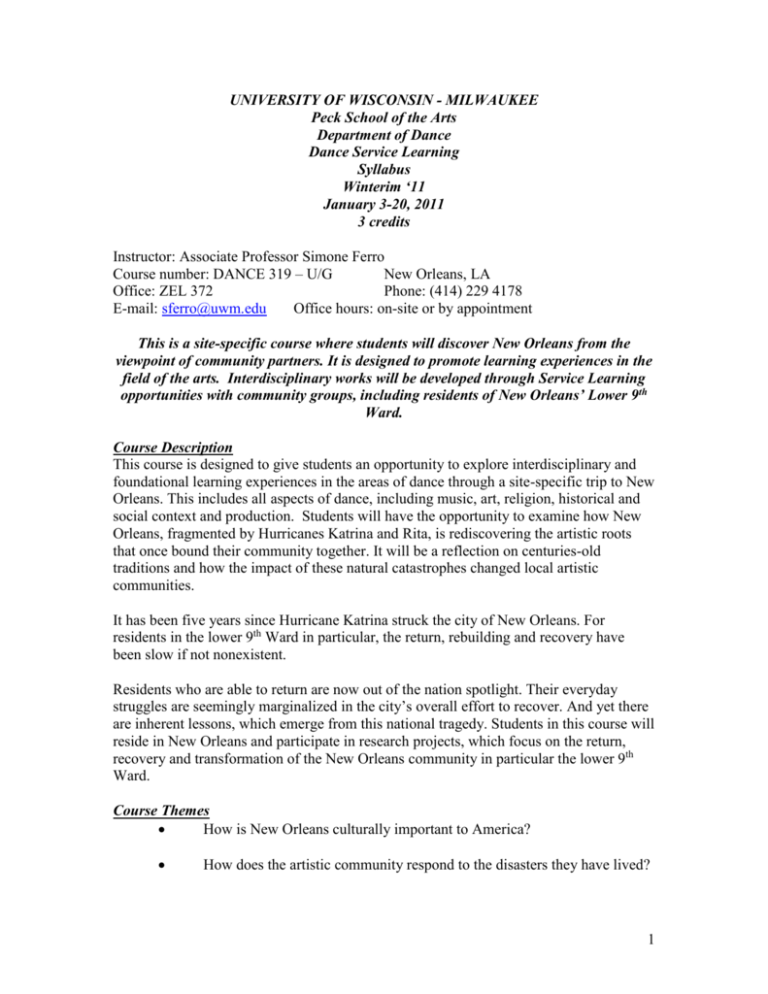
UNIVERSITY OF WISCONSIN - MILWAUKEE Peck School of the Arts Department of Dance Dance Service Learning Syllabus Winterim ‘11 January 3-20, 2011 3 credits Instructor: Associate Professor Simone Ferro Course number: DANCE 319 – U/G New Orleans, LA Office: ZEL 372 Phone: (414) 229 4178 E-mail: sferro@uwm.edu Office hours: on-site or by appointment This is a site-specific course where students will discover New Orleans from the viewpoint of community partners. It is designed to promote learning experiences in the field of the arts. Interdisciplinary works will be developed through Service Learning opportunities with community groups, including residents of New Orleans’ Lower 9th Ward. Course Description This course is designed to give students an opportunity to explore interdisciplinary and foundational learning experiences in the areas of dance through a site-specific trip to New Orleans. This includes all aspects of dance, including music, art, religion, historical and social context and production. Students will have the opportunity to examine how New Orleans, fragmented by Hurricanes Katrina and Rita, is rediscovering the artistic roots that once bound their community together. It will be a reflection on centuries-old traditions and how the impact of these natural catastrophes changed local artistic communities. It has been five years since Hurricane Katrina struck the city of New Orleans. For residents in the lower 9th Ward in particular, the return, rebuilding and recovery have been slow if not nonexistent. Residents who are able to return are now out of the nation spotlight. Their everyday struggles are seemingly marginalized in the city’s overall effort to recover. And yet there are inherent lessons, which emerge from this national tragedy. Students in this course will reside in New Orleans and participate in research projects, which focus on the return, recovery and transformation of the New Orleans community in particular the lower 9th Ward. Course Themes How is New Orleans culturally important to America? How does the artistic community respond to the disasters they have lived? 1 In what ways did the responses to Katrina inform our understanding of governmental, communal and personal responsibility as a response to this national disaster? To future disasters? What are perceptions of Race, Class and Citizenship after Katrina and how it impacts the artistic community? Course Objectives Students will gain understanding of New Orleans’ cultural contributions to the diversity in the arts in United States. Students will increase understanding of world dance and of contemporary dance forms Students will analyze performance and production in the context of New Orleans culture. Students will develop and make use of applied research methodologies through interactions with New Orleans community. Students will gain a greater understanding of the impact of culture and history on the local dance and performance. Each student will conduct a critical inquiry into understanding the many dimensions of governmental, communal and personal responsibility, which emerged in the wake of Hurricanes Katrina and Rita. Do we live in a world of “two Americas” which divides the world into the rich and poor? Students will investigate and learn how and in what ways race and other demographics influence the rebuilding efforts in New Orleans. A student in this course will be encouraged to use interdisciplinary themes to guide his/her research. Students’ applied research inquiries will incorporate research methods as part of the research inquiry e.g., feminization of poverty, music traditions, Mari Gras parade families, Social and Pleasure Clubs among other topics. Course Requirements You must be enrolled to attend this UWinterim course. Assignments will vary across students’ interests. Each student will identify an area of study for his/her research focus. This research focus will serve as a focal point for observations, service learning assignments and documentation activities. Students will have supervised learning experience. Cultural training, lectures, and outings to public events are all part of your immersion into New Orleans’ culture. Participation/Observation will include a variety of experiences. 2 20%- Reflective Journal Students will be required to keep a running daily journal with field notes of their experiences. Their notes will be then entered on D2L on a weekly basis (total of three weeks). These entries will be accompanied by any supporting materials the student feels appropriate to enhance his/hers portfolio. At the end of the UWinterim the student’s journal entries will be graded and shared with all the other students involved in the UWinterim classes. The entries must contain: personal reflections; observations regarding culture and diversity; and analysis of dance performances, classes, events and production you have observed. In classes and lectures, additional questions will be assigned and are to be included in the journal as well. Students will then use their journal entries notes to build their final research papers. Weekly assignments will focus on field notes/journal submissions. All students will keep extensive fieldwork journals, which will be reviewed on a weekly basis. You will be provided with how-to guide and focus questions at the orientation session. 30% - Research Students will do research on dance, music and other art forms in New Orleans through physical exploration, interviews, community interactions, service-learning experiences and extensive data collection. Activities will be conducted through on–site classes where students will study and practice different dance techniques, attend music events, observe architectural sites, try the local culinary, and experience related art forms. These skills will be integrated in a research where a comprehensive investigation (physical/dramatic/historical) will be developed. Students will be required to do original research on a chosen art medium among these: dance [folk and/or theatrical], music, Second Lines, Social & Pleasure clubs, Mardi Gras Indians, religion, or art (sacred or profane). Evaluation will be based on (1) students’ participation as active learners in each of the scheduled activities, (2) students’ initiative in seeking out additional sources of information and experience according to their interests (and consent of the instructor), (3) gathering of new information and development of new movement and music skills, and (4) combination these experiences in a creative product (e.g., a choreographic piece, a documentary work, analysis of interviews with New Orleans cultural participants). The specific research product of each student will be developed in consultation with the instructor to ensure its relevance to the theme of the course and its contribution to the overall richness of the course experience. Students will be responsible for developing their own projects within course guidelines. A partial, but not exclusive list, of research guidelines includes the following: 1) Written analysis and movement work (a) contrasting traditionally based popular culture and the abstractionism of modern dance, and (b) analyzing the importance of the codified art form understood as “high art” as a means for understanding and portraying folk traditions. 2) Edited video documentation illustrating some aspect of the topic of your 3 choice. 3) Research on the use of these art forms to express rebellion, ethnic identity, religiosity, social criticism, and sense of community. 4) Production of materials (photographic, video, written, oral presentation, choreographic work). All video projects must be completed and sent via QuickTime or DVD (edited with a maximum length of ten/twelve minutes) and word document attachment. Papers should be a minimum of 10 pages in length, double-spaced, font 11 or 12. I will be considering 75% of your grade for the paper’s content, insightfulness, presentation and 25% for the grammar and punctuation. Additional guidelines for the final paper will be given during the class. All entries must be in Microsoft Word (.doc or .docx). Please note: I will not be able to read documents using Word Perfect, so please DO NOT use this system. Preliminary paper proposal sferro@uwm.edu First Draft of Final Paper mail to sferro@uwm.edu Final Paper Friday January 7 – sent via e-mail to Thursday January 20 – sent via eMonday January 31 – entered in D2L Documentation will be an ongoing part of your experience in New Orleans. Digital and video cameras will be available. Each student will assist with the documentation activities. A collective repository will be developed documenting our work in New Orleans. It is hoped that a small committee will assist in providing each class member with a CD collection of photos taken. Students will receive instruction the equipment as part of their orientation in December. 20% - Service Learning Experiences Students in this course will have a residency in New Orleans, where they will engage in research, which is interdisciplinary in scope and supports students’ cross-cultural learning experiences. As part of this course, students will conduct interviews with artists, mostly residents in the Lower 9th Ward. These interviews will be determinate by the faculty. A questionnaire will be build by the students enrolled in the different classes related to the New Orleans UWinterim’11. Additionally, students will complete Service Learning assignments. These placements will include local museums, schools and community-arts based organizations, and community associations. These opportunities have the emphasis on the development of the student’s broad understanding of the New Orleans community. A list with all the organizations connected with the service learning aspects related to this course will be provided during the one-day orientation schedule on December 15th. 30% - Class Participation – Physical and intellectual Students will be expected to attend and analyze a number of events, lectures, presentations, classes, and service learning experiences. Each one of the above will involve some type of preparation (physical, intellectual and social). Attendance to all 4 classes, lectures, service learning sites and activities scheduled in this course is mandatory. Fail to comply with any of the required course work, related activities or attend any of the events organized for this course without a valid excuse will affect the overall grade of this class. Punctuality, promptness, physical and intellectual curiosity, commitment to the process, work ethic, group friendship and cordiality, will be taken into account in evaluation. On site in New Orleans the schedule may change. Opportunities for additional learning experiences may occur. They will be added to the schedule of activities when possible. Your flexibility is an important asset in these contexts. As part of the preparation for this course assignments on D2L have been organized will be assigned as part of the orientation to aid your understanding of the impact of Hurricane Katrina and Rita in New Orleans. You are expected to complete these assignments prior to your arrival in New Orleans January 3, 2011. UWinerim Common e-portfolios Students participating in this course will be required to collaborate to four different eportfolios sites related to this trip: 1. Related to the Interviews & field notes 2. Related to the questions you will share with your interviewees 3. Related to the service-learning site you will attend 4. Photo-gallery where students will enter your best pictures related to this course Grading Due to the participatory nature of this class, attendance and active participation in all events and activities is required. Plan to arrive on time, prepared, and ready to work. Plan also to take notes during and immediately after each event and reflect on how each experience can add to your final report. Student work will be evaluated according to originality, intellectual and physical investment, evidence of reflection and seriousness of thought, and application of skills and knowledge acquired during this trip. Required readings in e-reserve & in D2L Berry, J. (1988). African Cultural Memory in New Orleans Music. Black Music Research Journal 8(1), p. 3-12 Bodere, T. (2008). “to look at death another way”: Black teenage males’ perspectives on second-lines and regular funerals in New Orleans. Omega (Framingdale, N.Y.) V. 58 No. 3 (2008/2009) P. 213-32 Hellwig, B. (2010). Hard Times Don’t Last Forever. Dance Magazine. 84 (8) p. 22 Lipsitz, George. (1988) Mardi Gras Indians: Carnival and Counter-Narrative in Black New Orleans. Cultural Critique. No. 10 p. 100-121 Mc Kernan, J., & Mulcahy, K. (2008). Hurricane Katrina: A cultural Chernobyl. Journal of Arts Management, Law and Society, 38(3), p. 217-232 Regis, H. Blackness and the politics of memory in the New Orleans Second Line. American Ethnologist Vol. 28 (4) p. 752-777 Smith, Michael P. (1994) Behind the Lines: The Black Mardi Gras Indians and the New Orleans Second Line. Black Music Research Journal. Vol. 14 (1) p. 43-66 5 Optional readings in e-reserve & in D2L Marsalis, Ellis L. (1998) New Orleans jazz Funerals. American Visions, 13(5), 19-23 Turley, Alan C. (1995) The Ecological and Social Determinants of the Production of Dixieland Jazz in New Orleans. International Review of the Aesthetics and Sociology of Music. Vol. 26 (1) p. 107-121 Required Films available in D2L Trouble the Water University Policy and Procedures Website http://www.uwm.edu/Dept/SecU/SyllabusLinks.pdf Final grades will be assessed on the following scale A 95-100 points A92-94 points B+ 90-91 points B 89-83 points B82-80 points C+ 79-77 points C 76-72points C71-70 points D 69-65 points F 64 points or less 6
